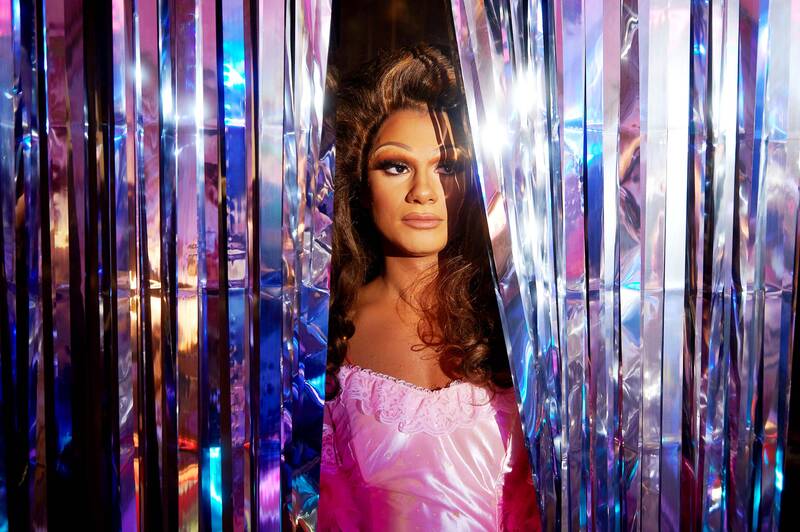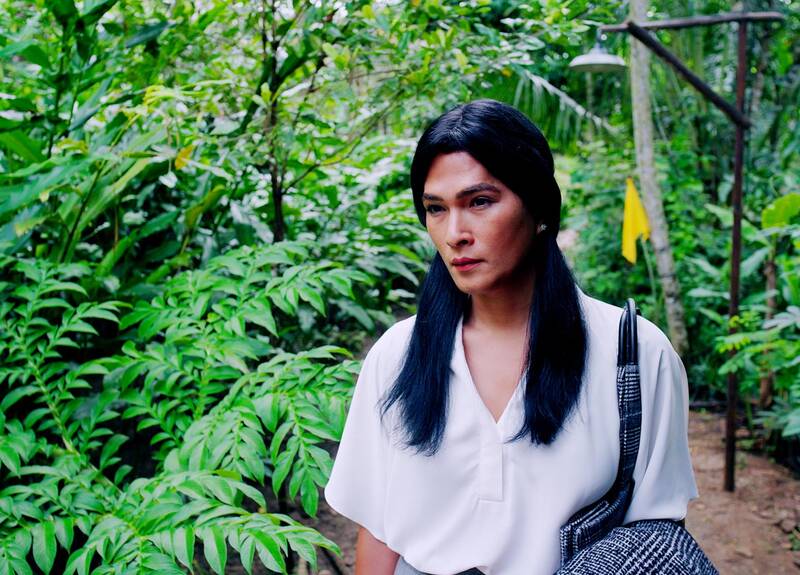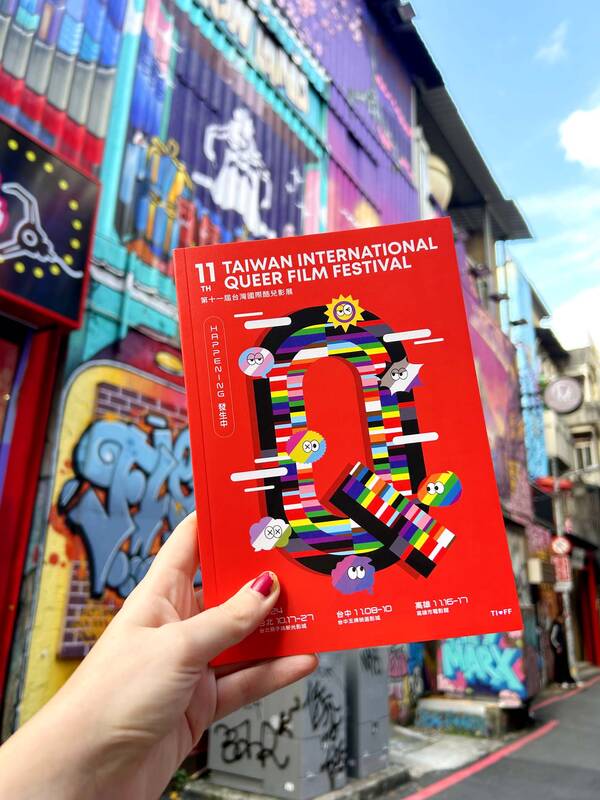The Taiwan International Queer Film Festival (台灣國際酷兒影展) is back for the eleventh year with its boldest lineup to date, emphasizing trans and non-binary stories and encompassing the full scope of queer experiences through queer cinema.
“The festival looks at which LGBTQ+ issues are being discussed around the world and within Taiwan. This year we want people to understand that there’s more than just L, G, B and T,” said Vita Lin (林杏鴻), co-founder and director of the Taiwan International Queer Film Festival (TIQFF).
Running in Taipei from Thursday to Oct. 27, before moving to Taichung and Kaohsiung, the festival presents over 20 feature films and documentaries with 26 short films.

Photo courtesy of Taiwan International Queer Film Festival
With Taipei’s pride parade later this month, TIQFF will begin the celebrations this Thursday at Ximending’s funky street art hub Taipei Cinema Park, with screenings hosted at nearby Shin Kong Cinemas.
Queer cinema has long featured the well-trodden tropes of first love, the gay male gaze, coming out and coming-of-age biopics, Lin said, but the TIQFF 2024 strives to shine a light on lesser heard stories in the LGBTQ+ community.
This year’s selection features trans parenthood to throuples, later-life queer love and intergenerational family dynamics, pushing the boundaries of queer cinema. With a vibrant international line-up of feature films, with submissions from Georgia to Japan, Indonesia to Argentina, the festival facilitates discussions of queer issues around the world.

Photo courtesy of Taiwan International Queer Film Festival Photo courtesy of Taiwan International Queer Film Festival
QUEER LIVES
Festival programmer Benson Wu (吳燿祖) said that this year’s theme is “happening,” which expresses that queer lives are happening all around us.
Opening film Layla is the first in the festival’s history to center non-binary and trans stories. The writing and directorial debut of British-Palestinian Amrou Al-Kadhi, the film uses a autobiographic lens to depict Layla, a drag queen on stage but, crucially, a non-binary person-of-color off-stage, in their quest for love. We watch them battle with their identity between their glamorous stage persona, real-life identity and closeted struggles within their Palestinian family.

Photo: Hollie Younger
Lin explains that after Nymphia Wind’s historic Ru Paul’s Drag Race win for Taiwan, drag performances are becoming more mainstream, particularly after her homecoming performance at the Presidential Office Building. However, misunderstandings remain — for some performers, gender fluidity and gender queerness are also a part of their lives off-stage. While many screenings explore hard-hitting issues, TIQFF is also a party of queer joy and resilience, encapsulated in Layla’s mix of complexity and celebration.
“The party scene of the film is so fun, it’s just perfect for the opening film — we needed something more uplifting. . . Sometimes queers just want to have fun,” Wu said.
This energy will carry over to Friday night’s opening party with drag queens and a king, singing, dancing and comedy. The festival also offers Q&As, panels and scriptwriting workshops.
Saturday hosted a panel with Hong Kong director Scud (雲翔), ahead of the festival’s special screening of his ninth and penultimate film Ghosts Just Want To Have Fun. Folks afraid of full-frontal nudity should steer clear of this one, with Scud upholding his reputation for the extensive use of male-male scenes depicting torrid love stories.
LOCAL TALENT
This year will host a Made In Taiwan Shorts competition, and local directors’ A Journey In Spring (春行) will be the only Taiwanese feature film. Centering on an older, rural Taiwanese couple coming to grips with their son’s gay identity, the dialogue is entirely in Hoklo (more commonly known as Taiwanese). Lin said the film explores a “very Taiwanese story” in its poignant portrayal of traditional intergenerational family dynamics.
Lin and Wu said this year saw fewer Taiwanese submissions than in previous years. Wu said that as Taiwan has become so open to LGBTQ+ issues, queer cinema has become an accepted at mainstream film festivals such as Sundance and Golden Horse.
Lin added that Taiwanese submissions were more conservative, with few digging beyond the stereotypical coming-of-age and first-lovestereotypes. Organizers had hoped to open a First Nations Short Film category, but the project was closed after a lack of submissions.
The festivals’ discussion panels and community building will therefore play a key role in platforming these lesser-heard voices, creating safe spaces and encouraging international discussions of queer issues.
Wu hopes that international creators can inspire Taiwanese directors to tell more diverse stories in the coming years, particularly relating to trans issues.
“We’re hoping to raise awareness and understanding about this topic which I don’t think we get to talk about a lot,” he said.
But for 2024, TIQFF brings Taipei a groundbreaking international lineup, where LGBTQ+ stories are not just happening — they’re thriving, evolving and celebrating queerness in all its forms.
“Quite selfishly, I just want people to have a good time,” said Wu.

Google unveiled an artificial intelligence tool Wednesday that its scientists said would help unravel the mysteries of the human genome — and could one day lead to new treatments for diseases. The deep learning model AlphaGenome was hailed by outside researchers as a “breakthrough” that would let scientists study and even simulate the roots of difficult-to-treat genetic diseases. While the first complete map of the human genome in 2003 “gave us the book of life, reading it remained a challenge,” Pushmeet Kohli, vice president of research at Google DeepMind, told journalists. “We have the text,” he said, which is a sequence of

On a harsh winter afternoon last month, 2,000 protesters marched and chanted slogans such as “CCP out” and “Korea for Koreans” in Seoul’s popular Gangnam District. Participants — mostly students — wore caps printed with the Chinese characters for “exterminate communism” (滅共) and held banners reading “Heaven will destroy the Chinese Communist Party” (天滅中共). During the march, Park Jun-young, the leader of the protest organizer “Free University,” a conservative youth movement, who was on a hunger strike, collapsed after delivering a speech in sub-zero temperatures and was later hospitalized. Several protesters shaved their heads at the end of the demonstration. A

In August of 1949 American journalist Darrell Berrigan toured occupied Formosa and on Aug. 13 published “Should We Grab Formosa?” in the Saturday Evening Post. Berrigan, cataloguing the numerous horrors of corruption and looting the occupying Republic of China (ROC) was inflicting on the locals, advocated outright annexation of Taiwan by the US. He contended the islanders would welcome that. Berrigan also observed that the islanders were planning another revolt, and wrote of their “island nationalism.” The US position on Taiwan was well known there, and islanders, he said, had told him of US official statements that Taiwan had not

We have reached the point where, on any given day, it has become shocking if nothing shocking is happening in the news. This is especially true of Taiwan, which is in the crosshairs of the Chinese Communist Party (CCP), uniquely vulnerable to events happening in the US and Japan and where domestic politics has turned toxic and self-destructive. There are big forces at play far beyond our ability to control them. Feelings of helplessness are no joke and can lead to serious health issues. It should come as no surprise that a Strategic Market Research report is predicting a Compound